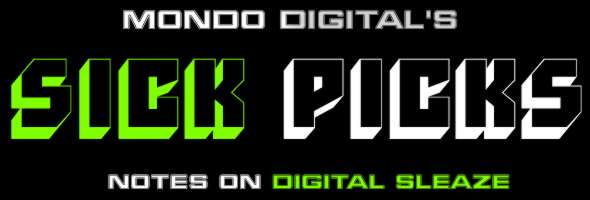

OCTOBER 1, 2010
With the DVD landscape in turmoil, one of the brighter spots for movie fans has been the advent of MOD (which stands for "manufacturing on demand" or "made on demand") releases from studios, focusing on titles that were below the radar enough to dodge a regular DVD release. Yep, they're basically glorified DVD-R releases, but considering the rarity of many of the titles and the sometimes astonishing quality, quite a few are worth noticing. The leader of this pack is easily Warner Archive, which unleashes new titles every other Tuesday with often wildly unpredictable results. Universal and MGM tried copycat systems directly through Amazon that have proven far less effective, mainly because there's no effective way of finding out what titles they're offering and when new ones are added. (Plus all the MGM ones look like crap.) Much more interesting and a good competitor to Warner is Sony's Columbia Classics line, which boasts the advantage of using only top of the line HD transfers for obscure titles you'd never dream of getting official releases. This special edition of Sick Picks focuses on a few of the more noteworthy recent titles, which will hopefully at least prove to be a starting point into this wild and wooly cousin to regular DVD collecting.
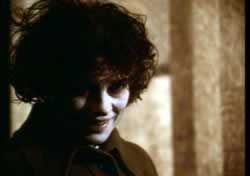 The same year he appeared in Star Wars, Harrison Ford also popped up on TVs across America in a little-known, made-for-TV Exorcist imitation called The Possessed. Unlike all the previous rip-offs like Abby, Beyond the Door, etc., this one had the distinction of being made by the original film's litigious production company, Warner Brothers, who apparently decided to time was right to officially cash in on one of the biggest hits. James Farentino (who was about to become a familiar face on Airwolf and Dynasty but, more importantly, had Dead & Buried to look forward to) stars as Father Kevin, a priest specializing in exorcisms who really has his hands full when he tangles with a girls' boarding school in Salem, Massachusetts where the girls act weirdly, the headmistress (Joan Hackett) acts ever weirder, and every day seems to be plagued with spontaneous combustions. You know the routine, but the overqualified cast (with Ford as a teacher) is a whole lot of fun to watch including vets like P.J. Soles (pre-Halloween), Dinah Manoff, and Diana Scarwid. It's pretty amusing nonsense similar to other TV movies of the time like Satan's School for Girls, and the swimming pool finale is pretty lively with a demonic Hackett doing battle with our servant of the Lord. The Warner Archive release appears to be taken from a fairly dated but certainly acceptable master probably created a few years ago for syndication or home video purposes; it's nowhere near their best, but anyone curious about this rarely seen oddity should be more than pleased anyway.
The same year he appeared in Star Wars, Harrison Ford also popped up on TVs across America in a little-known, made-for-TV Exorcist imitation called The Possessed. Unlike all the previous rip-offs like Abby, Beyond the Door, etc., this one had the distinction of being made by the original film's litigious production company, Warner Brothers, who apparently decided to time was right to officially cash in on one of the biggest hits. James Farentino (who was about to become a familiar face on Airwolf and Dynasty but, more importantly, had Dead & Buried to look forward to) stars as Father Kevin, a priest specializing in exorcisms who really has his hands full when he tangles with a girls' boarding school in Salem, Massachusetts where the girls act weirdly, the headmistress (Joan Hackett) acts ever weirder, and every day seems to be plagued with spontaneous combustions. You know the routine, but the overqualified cast (with Ford as a teacher) is a whole lot of fun to watch including vets like P.J. Soles (pre-Halloween), Dinah Manoff, and Diana Scarwid. It's pretty amusing nonsense similar to other TV movies of the time like Satan's School for Girls, and the swimming pool finale is pretty lively with a demonic Hackett doing battle with our servant of the Lord. The Warner Archive release appears to be taken from a fairly dated but certainly acceptable master probably created a few years ago for syndication or home video purposes; it's nowhere near their best, but anyone curious about this rarely seen oddity should be more than pleased anyway.
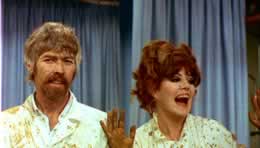 So, back to overqualified talent; Sidney Lumet made a name for himself as a director of powerful dramas for TV and the big screen including a celebrated 1960 adaptation of Tennessee Williams' The Fugitive Kind. When he decided to tackle the playwright again a decade later, Last of the Mobile Hot Shots seemed like a sure thing: a screenplay by Gore Vidal from Williams' obscure cult play Seven Descents of Myrtle, a leading role for James Coburn, cinematography by the great James Wong Howe (Seconds), and a hip score by Quincey Jones. However, the result turned out to be one of the weirdest major studio releases of all time, a hothouse freak show that now looks like it got beamed from a completely different planet. The insanity begins when reclusive Jeb (Coburn) is recruited off the streets of Mobile, Alabama to appear on a tacky game show (similar to the later Sweet Movie) where, as a publicity stunt involving some easy cash, he winds marrying a complete stranger, a floozy named Myrtle (Lynn Redgrave, doing one of the most overbaked southern accents ever committed to film). He takes her home to his half-completed house where, along with his black brother George (Perry Hayes), he hopes to revive the great southern tradition of plantation ownership... but first Myrtle has to swipe a legally binding piece of paper promising the property to George when Jeb kicks the bucket. Through sordid, nudity-packed flashbacks we learn how the brothers apparently had orgies and swapped interracial sex partners in the Army, while in the present day, everyone yells and sweats and gets ready for a big rain that just might flood the whole house in time for the big finale. Not surprisingly, pretty much everyone disavowed this one after its release, and between this and the equally befuddling Boom!, Williams' name was mud at the box office for many years to come. It's pretty fascinating though, and as far as pretentious, dirty-minded smut for English majors goes, you could do a lot worse. Not surprisingly, Warner neglected to include this in their prestigious Tennessee Williams DVD box set, but it did merit a Warner Archive release that's presented in anamorphic widescreen (1.78:1) but definitely looks the worse for wear; it certainly beats any of the heavily cut TV versions floating around, but don't expect a knockout presentation as this barely looks better than a laserdisc. The equally freakish theatrical trailer is also included, and the disc comes packaged with the confusing theatrical poster art whose designer apparently misunderstood the meaning of the word "Mobile" in the title.
So, back to overqualified talent; Sidney Lumet made a name for himself as a director of powerful dramas for TV and the big screen including a celebrated 1960 adaptation of Tennessee Williams' The Fugitive Kind. When he decided to tackle the playwright again a decade later, Last of the Mobile Hot Shots seemed like a sure thing: a screenplay by Gore Vidal from Williams' obscure cult play Seven Descents of Myrtle, a leading role for James Coburn, cinematography by the great James Wong Howe (Seconds), and a hip score by Quincey Jones. However, the result turned out to be one of the weirdest major studio releases of all time, a hothouse freak show that now looks like it got beamed from a completely different planet. The insanity begins when reclusive Jeb (Coburn) is recruited off the streets of Mobile, Alabama to appear on a tacky game show (similar to the later Sweet Movie) where, as a publicity stunt involving some easy cash, he winds marrying a complete stranger, a floozy named Myrtle (Lynn Redgrave, doing one of the most overbaked southern accents ever committed to film). He takes her home to his half-completed house where, along with his black brother George (Perry Hayes), he hopes to revive the great southern tradition of plantation ownership... but first Myrtle has to swipe a legally binding piece of paper promising the property to George when Jeb kicks the bucket. Through sordid, nudity-packed flashbacks we learn how the brothers apparently had orgies and swapped interracial sex partners in the Army, while in the present day, everyone yells and sweats and gets ready for a big rain that just might flood the whole house in time for the big finale. Not surprisingly, pretty much everyone disavowed this one after its release, and between this and the equally befuddling Boom!, Williams' name was mud at the box office for many years to come. It's pretty fascinating though, and as far as pretentious, dirty-minded smut for English majors goes, you could do a lot worse. Not surprisingly, Warner neglected to include this in their prestigious Tennessee Williams DVD box set, but it did merit a Warner Archive release that's presented in anamorphic widescreen (1.78:1) but definitely looks the worse for wear; it certainly beats any of the heavily cut TV versions floating around, but don't expect a knockout presentation as this barely looks better than a laserdisc. The equally freakish theatrical trailer is also included, and the disc comes packaged with the confusing theatrical poster art whose designer apparently misunderstood the meaning of the word "Mobile" in the title.
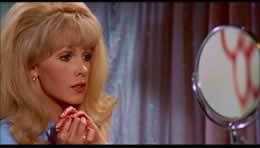 After the success of What Ever Happened to Baby Jane?, the '60s became a hotbed of "hag horror" hits filled with over-the-hill starlets getting another shot at stardom by running amuck with hatchets and butcher knives. One of the more fascinating yet strangely ignored of the pack is 1969's The Mad Room, a severe overhaul of the 1941 gothic thriller Ladies in Retirement (itself based on a Reginald Dunham play of the same name, inspired by a real 19th Century crime case in France). Blonde bombshell Stella Stevens gets to really strut her stuff here as a straitlaced woman about to marry a wealthy Angeleno whose mother (Shelley Winters, deliciously devouring scenery as usual) runs the house with a velvet fist. Stella's less than pleased when she gets a letter informing her that her two younger siblings are being released from a mental institution where they've been held since the brutal murder of their parents (which was committed by one of them... or both; neither is quite sure). Stella decides to take them into her home without telling Shelley about their gory past, but when the truth comes out, the id really hits the fan. Lurid, campy, and sometimes very bloody (including a prolonged gag involving a nasty severed hand and a nosy dog that Lucio Fulci later swiped for New York Ripper), this is a really strange delight from loopy director Bernard Girard, who also churned out Dead Heat on a Merry-Go-Round, Hunters Are for Killing, The Mind Snatchers, and A Name for Evil. Apparently this was a very troubled production (which is obvious given the 50 or so dangling plot threads at the end), but even so, it's a hell of a lot of fun. Dave Grusin turns out an oddball creepy jazz score, too, but the real showstopper here is a cameo by '50 scream queen Beverly Garland, who shows up drunk at an afternoon ladies' garden party, offers free erotic massages with happy endings from her husband to everyone in attendance, bellows "Don't you think I know I'm married to a male whore!," and stumbles sobbing upstairs to slash her wrists with a broken medicine bottle. That's pretty much worth the purchase price alone. Sony's disc is a real stunner, with those super-saturated colors you find in stuff like Beyond the Valley of the Dolls and Angel, Angel, Down We Go. Prior bootlegs and awful TV prints really gave no idea how good this could look.
After the success of What Ever Happened to Baby Jane?, the '60s became a hotbed of "hag horror" hits filled with over-the-hill starlets getting another shot at stardom by running amuck with hatchets and butcher knives. One of the more fascinating yet strangely ignored of the pack is 1969's The Mad Room, a severe overhaul of the 1941 gothic thriller Ladies in Retirement (itself based on a Reginald Dunham play of the same name, inspired by a real 19th Century crime case in France). Blonde bombshell Stella Stevens gets to really strut her stuff here as a straitlaced woman about to marry a wealthy Angeleno whose mother (Shelley Winters, deliciously devouring scenery as usual) runs the house with a velvet fist. Stella's less than pleased when she gets a letter informing her that her two younger siblings are being released from a mental institution where they've been held since the brutal murder of their parents (which was committed by one of them... or both; neither is quite sure). Stella decides to take them into her home without telling Shelley about their gory past, but when the truth comes out, the id really hits the fan. Lurid, campy, and sometimes very bloody (including a prolonged gag involving a nasty severed hand and a nosy dog that Lucio Fulci later swiped for New York Ripper), this is a really strange delight from loopy director Bernard Girard, who also churned out Dead Heat on a Merry-Go-Round, Hunters Are for Killing, The Mind Snatchers, and A Name for Evil. Apparently this was a very troubled production (which is obvious given the 50 or so dangling plot threads at the end), but even so, it's a hell of a lot of fun. Dave Grusin turns out an oddball creepy jazz score, too, but the real showstopper here is a cameo by '50 scream queen Beverly Garland, who shows up drunk at an afternoon ladies' garden party, offers free erotic massages with happy endings from her husband to everyone in attendance, bellows "Don't you think I know I'm married to a male whore!," and stumbles sobbing upstairs to slash her wrists with a broken medicine bottle. That's pretty much worth the purchase price alone. Sony's disc is a real stunner, with those super-saturated colors you find in stuff like Beyond the Valley of the Dolls and Angel, Angel, Down We Go. Prior bootlegs and awful TV prints really gave no idea how good this could look.
 An earlier and even stranger Stella Stevens film, Synanon, opened in 1965 and, though it was still a decade after The Man with the Golden Arm, caught a lot of flack for its vivid depiction of smack addicts trying to crawl back to normalcy. Comedy director Richard Quine definitely took a dark turn with this one, whose title refers to a real rehab house set up in Santa Monica where recovering alcoholic Chuck Dederich (Edmond O'Brien) has set up a treatment center for heroin addicts who had nowhere else to turn at the time. Of course, this being a Hollywood film, these also happen to be the most beautiful, healthy-looking junkies on film, but what do you expect? A pre-Airwolf Alex Cord is our protagonist, the improbably-named Zankie Albo who tangles with a former cellmate (Chuck Connors) and a pretty potential love interest (Stevens), not to mention a pre-Batman Eartha Kitt who opens the film onstage admitting "I was what you call a swinger; I sold my body for a fix." Speaking of Batman, the composer of that series' indelible theme song, the fantastic Neal Hefti, turns in a haunting, catchy music score that's easily the best thing about the film and worth hunting down on vinyl. Richard Conte and Alejandro Rey are also on hand among the "human rejects," all of whom give the most heavy-handed sermons this side of a real AA meeting. As it turns out, Synanon went on to become a very dangerous cult under Dederich, with increasingly violent behavior landing in a series of controversial news stories that ground it into oblivion by the mid-'90s. (Check out its Wikipedia entry; fascinating, creepy stuff.) Given the extreme public humiliation involved with the production in subsequent years, this never got an official video release and rarely popped up on TV. Sony's on-demand edition is going to be a first-time encounter for most viewers, and it's a doozy; if you get a kick out of warped, misguided anti-drug films, this is essential viewing. The packaging contains the original much-debated poster art, which slapped a black bar over a painted depiction of Connors tying off a vein. Picture quality is very impressive from start to finish, and surprisingly, a fresh transfer of the theatrical trailer is included, too.
An earlier and even stranger Stella Stevens film, Synanon, opened in 1965 and, though it was still a decade after The Man with the Golden Arm, caught a lot of flack for its vivid depiction of smack addicts trying to crawl back to normalcy. Comedy director Richard Quine definitely took a dark turn with this one, whose title refers to a real rehab house set up in Santa Monica where recovering alcoholic Chuck Dederich (Edmond O'Brien) has set up a treatment center for heroin addicts who had nowhere else to turn at the time. Of course, this being a Hollywood film, these also happen to be the most beautiful, healthy-looking junkies on film, but what do you expect? A pre-Airwolf Alex Cord is our protagonist, the improbably-named Zankie Albo who tangles with a former cellmate (Chuck Connors) and a pretty potential love interest (Stevens), not to mention a pre-Batman Eartha Kitt who opens the film onstage admitting "I was what you call a swinger; I sold my body for a fix." Speaking of Batman, the composer of that series' indelible theme song, the fantastic Neal Hefti, turns in a haunting, catchy music score that's easily the best thing about the film and worth hunting down on vinyl. Richard Conte and Alejandro Rey are also on hand among the "human rejects," all of whom give the most heavy-handed sermons this side of a real AA meeting. As it turns out, Synanon went on to become a very dangerous cult under Dederich, with increasingly violent behavior landing in a series of controversial news stories that ground it into oblivion by the mid-'90s. (Check out its Wikipedia entry; fascinating, creepy stuff.) Given the extreme public humiliation involved with the production in subsequent years, this never got an official video release and rarely popped up on TV. Sony's on-demand edition is going to be a first-time encounter for most viewers, and it's a doozy; if you get a kick out of warped, misguided anti-drug films, this is essential viewing. The packaging contains the original much-debated poster art, which slapped a black bar over a painted depiction of Connors tying off a vein. Picture quality is very impressive from start to finish, and surprisingly, a fresh transfer of the theatrical trailer is included, too.
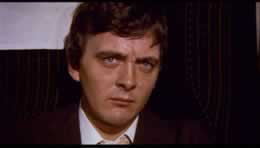 Speaking of junkies, the always great David Hemmings (Deep Red, Blow-Up) plays a recovering one in a particularly freaked-out 1970 British thriller called Fragment of Fear, which also has the distinction of being director Richard C. Sarafian's warm-up for the next year's immortal Vanishing Point (and followed by the very underrated but worthwhile Man in the Wilderness, Lolly-Madonna XXX, and The Man Who Loved Cat Dancing). Hemmings stars as Tim Brett, an Englishman traveling in Italy who's written a book about his recovery which turns out to be seriously questioned by everyone around him when his aunt winds up dead at the bottom of some rocky steps. Upon returning to London, he decides to investigate what he believes to be a murder with the aid of a schoolteacher (Gayle Hunnicutt) and becomes the target of escalating weirdness including threatening phone calls, cryptic letters, and strangers behaving in a very menacing manner, all leading up to the whacked-out twist ending. Hemmings really gets to strut his stuff here with lots of sweating and ranting, a fine companion piece to an even better (and, sadly, equally obscure) shocker he made the following year, Unman, Wittering and Zigo. The rest of the cast is pretty fascinating, too, including old pros like Flora Robson, Wilfrid Hyde-White, Daniel Massey, and even Bond villain Adolfo Celi. The real deal breaker here for a lot of viewers is the catchy but wildly aggressive jazz score by Johnny Harris (which was later recycled the same year for his LP Movements); I personally like it a lot, but anyone who's seen Anchorman will be reduced to giggle fits every time that damn jazz flute starts blaring on the soundtrack. Sony's release looks way, way better than the cruddy British VHS release from the early '80s, which was the only really accessible way to see this until now. The visual scheme looks very similar to other shockers of the same vintage like Don't Look Now, and overall it's very satisfying. Perhaps the best thing on the disc is the wild, wild theatrical trailer, a brilliantly edited piece of visual insanity that perfectly captures the nutso flavor of the main feature in two tidy minutes.
Speaking of junkies, the always great David Hemmings (Deep Red, Blow-Up) plays a recovering one in a particularly freaked-out 1970 British thriller called Fragment of Fear, which also has the distinction of being director Richard C. Sarafian's warm-up for the next year's immortal Vanishing Point (and followed by the very underrated but worthwhile Man in the Wilderness, Lolly-Madonna XXX, and The Man Who Loved Cat Dancing). Hemmings stars as Tim Brett, an Englishman traveling in Italy who's written a book about his recovery which turns out to be seriously questioned by everyone around him when his aunt winds up dead at the bottom of some rocky steps. Upon returning to London, he decides to investigate what he believes to be a murder with the aid of a schoolteacher (Gayle Hunnicutt) and becomes the target of escalating weirdness including threatening phone calls, cryptic letters, and strangers behaving in a very menacing manner, all leading up to the whacked-out twist ending. Hemmings really gets to strut his stuff here with lots of sweating and ranting, a fine companion piece to an even better (and, sadly, equally obscure) shocker he made the following year, Unman, Wittering and Zigo. The rest of the cast is pretty fascinating, too, including old pros like Flora Robson, Wilfrid Hyde-White, Daniel Massey, and even Bond villain Adolfo Celi. The real deal breaker here for a lot of viewers is the catchy but wildly aggressive jazz score by Johnny Harris (which was later recycled the same year for his LP Movements); I personally like it a lot, but anyone who's seen Anchorman will be reduced to giggle fits every time that damn jazz flute starts blaring on the soundtrack. Sony's release looks way, way better than the cruddy British VHS release from the early '80s, which was the only really accessible way to see this until now. The visual scheme looks very similar to other shockers of the same vintage like Don't Look Now, and overall it's very satisfying. Perhaps the best thing on the disc is the wild, wild theatrical trailer, a brilliantly edited piece of visual insanity that perfectly captures the nutso flavor of the main feature in two tidy minutes.
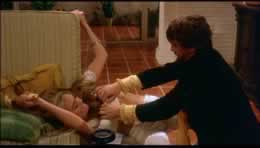 Aaaand speaking of David Hemmings, if you want to see him prance around in a big fluffy fur coat, blackmail a gold slave bracelet from the object of his affection, and launch into a hair-pulling, bitch-slapping cat fight with Dyan Cannon in which he gets whacked on the head with an Oscar statuette, look no further than The Love Machine. This might be the funniest of the big studio adaptations of Jacqueline Susann novels in the wake of the "success" of Valley of the Dolls, all of which chart the treacherous road to success and sluttiness by selfish white people. Our "hero" this time is Robin Stone (played by John Phillip Law, making his angel role in Barbarella look caffeinated in comparison). As the title song by Dionne Warwick informs us, this "love machine" is "movin' on" to bigger and better things, namely media superstardom and the bottomless lust of thousands of women with giant hair. Is he a movie star? A big time tennis player? A talk show host? No, my friends, this stud to rule them all is... a news anchorman. A really, really bad anchorman. Married Cannon has her eyes set on our boy Robin but gets jealous when he keeps dabbling with other women, including a shower threeway with Playboy centerfold twins Madeleine and Mary Collinson (the same year they starred in Twins of Evil) that, ahem, climaxes with Cannon sneaking in to set their bed on fire. Robert Ryan and Jackie Cooper are also on hand to spit out lots of stupid dialogue, while Susann herself pops up as a newscaster, disregarding the fact that huge, important chunks of the book have been left out. Once again, Sony's HD-sourced transfer knocks the ancient broadcast masters and VHS versions way out of the water; this is glossy trash all the way and finally looks as crisp and vibrant as an opening day print. Sadly there's no theatrical trailer on hand, but there's way more than enough entertainment value for one disc. Incredibly, the third and final Susann film adaptation, Once Is Not Enough, came out on DVD two weeks after this one, which means the unholiest camp trilogy in movie history can finally be complete in your very own home.
Aaaand speaking of David Hemmings, if you want to see him prance around in a big fluffy fur coat, blackmail a gold slave bracelet from the object of his affection, and launch into a hair-pulling, bitch-slapping cat fight with Dyan Cannon in which he gets whacked on the head with an Oscar statuette, look no further than The Love Machine. This might be the funniest of the big studio adaptations of Jacqueline Susann novels in the wake of the "success" of Valley of the Dolls, all of which chart the treacherous road to success and sluttiness by selfish white people. Our "hero" this time is Robin Stone (played by John Phillip Law, making his angel role in Barbarella look caffeinated in comparison). As the title song by Dionne Warwick informs us, this "love machine" is "movin' on" to bigger and better things, namely media superstardom and the bottomless lust of thousands of women with giant hair. Is he a movie star? A big time tennis player? A talk show host? No, my friends, this stud to rule them all is... a news anchorman. A really, really bad anchorman. Married Cannon has her eyes set on our boy Robin but gets jealous when he keeps dabbling with other women, including a shower threeway with Playboy centerfold twins Madeleine and Mary Collinson (the same year they starred in Twins of Evil) that, ahem, climaxes with Cannon sneaking in to set their bed on fire. Robert Ryan and Jackie Cooper are also on hand to spit out lots of stupid dialogue, while Susann herself pops up as a newscaster, disregarding the fact that huge, important chunks of the book have been left out. Once again, Sony's HD-sourced transfer knocks the ancient broadcast masters and VHS versions way out of the water; this is glossy trash all the way and finally looks as crisp and vibrant as an opening day print. Sadly there's no theatrical trailer on hand, but there's way more than enough entertainment value for one disc. Incredibly, the third and final Susann film adaptation, Once Is Not Enough, came out on DVD two weeks after this one, which means the unholiest camp trilogy in movie history can finally be complete in your very own home.
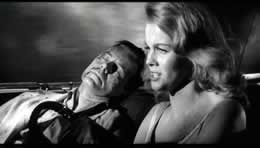 When it comes to campy trash, though, it's hard to beat the hair-swinging, teeth-gnashing portrayal of Ann-Margret as a Kitten with a Whip, a loony rehash of the already berserk film noir curio Where Danger Lives. Here she's Jody, a juvenile delinquent in a nightie who crashes into the suburban home of John Forsythe (whose wife is away for the weekend) and changes her sob story every five minutes. The little psycho eventually brings in some of her even more debauched beatnik buddies who drag our hero down to Tijuana for a violent finale. Memorably lampooned on Mystery Science Theater 3000, this junky treat from Universal uses a lot of talent behind and in front of the camera from the recently deceased TV show Thriller (including director Douglas Heyes and co-stars Richard Anderson and Patricia Barry) and boasts some of the same deliciously sordid noir atmosphere, but that's where the similarity ends. Incredibly, this was sandwiched between A-M's two biggest hits, Bye Bye Birdie and Viva Las Vegas, and apparently the lack of dance numbers here caused her to fuel her considerable energy into a performance that threatens to devour your entire TV set. Universal trotted this out on VHS for about five minutes, but their on-demand disc through Amazon looks a whole lot better. It's anamorphically enhanced and looks excellent, while the restoration of the original 1.85:1 aspect ratio (lopping off tons of awkward, excessive headroom) at least makes it look like a real movie again.
When it comes to campy trash, though, it's hard to beat the hair-swinging, teeth-gnashing portrayal of Ann-Margret as a Kitten with a Whip, a loony rehash of the already berserk film noir curio Where Danger Lives. Here she's Jody, a juvenile delinquent in a nightie who crashes into the suburban home of John Forsythe (whose wife is away for the weekend) and changes her sob story every five minutes. The little psycho eventually brings in some of her even more debauched beatnik buddies who drag our hero down to Tijuana for a violent finale. Memorably lampooned on Mystery Science Theater 3000, this junky treat from Universal uses a lot of talent behind and in front of the camera from the recently deceased TV show Thriller (including director Douglas Heyes and co-stars Richard Anderson and Patricia Barry) and boasts some of the same deliciously sordid noir atmosphere, but that's where the similarity ends. Incredibly, this was sandwiched between A-M's two biggest hits, Bye Bye Birdie and Viva Las Vegas, and apparently the lack of dance numbers here caused her to fuel her considerable energy into a performance that threatens to devour your entire TV set. Universal trotted this out on VHS for about five minutes, but their on-demand disc through Amazon looks a whole lot better. It's anamorphically enhanced and looks excellent, while the restoration of the original 1.85:1 aspect ratio (lopping off tons of awkward, excessive headroom) at least makes it look like a real movie again.
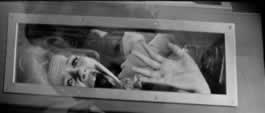 What happens when someone tries to rip off William Castle, the lovable showman who made a fortune trying to out-ballyhoo Alfred Hitchcock? The simple answer is Two on a Guillotine, a fun spook house curio that's one of three eccentric, very entertaining thrillers directed by busy TV actor William Conrad. (The other two are Brainstorm and My Blood Runs Cold, both also available from Warner Archive and worth a look.) '60s sex kitten Connie Stevens stars as Cassie, a perky blonde whose peculiar and famous magician dad (Cesar Romero) has died and left her his sprawling, trick-laden mansion... under the condition that she survive living there for seven nights in a row. A snooping reporter (Dean Jones) romances his way into her life and helps uncover the secrets involving her mother's mysterious death involving a guillotine act gone very, very wrong. This B&W scope shocker is a crackerjack 80-minutes of fun... but unfortunately it happens to be 107 minutes long, which means you have to put up with at least half an hour of romantic blather between Jones and Stevens. Once you get past that, it delivers some fine surprises including a deranged dream sequence, an early will reading at the Hollywood Bowl(!), and a fun visit to a go-go club with dancing girls in cages. The climactic twist doesn't make much sense if you stop and think about it, so sit back, whip up some popcorn, and switch your brain off as soon as the credits roll. Warner Archive's release is part of their vaunted "Remastered" sub-line which basically means it's a fresher, progressive transfer; the anamorphic presentation looks pretty great overall and stacks up well against their general commercial DVD titles.
What happens when someone tries to rip off William Castle, the lovable showman who made a fortune trying to out-ballyhoo Alfred Hitchcock? The simple answer is Two on a Guillotine, a fun spook house curio that's one of three eccentric, very entertaining thrillers directed by busy TV actor William Conrad. (The other two are Brainstorm and My Blood Runs Cold, both also available from Warner Archive and worth a look.) '60s sex kitten Connie Stevens stars as Cassie, a perky blonde whose peculiar and famous magician dad (Cesar Romero) has died and left her his sprawling, trick-laden mansion... under the condition that she survive living there for seven nights in a row. A snooping reporter (Dean Jones) romances his way into her life and helps uncover the secrets involving her mother's mysterious death involving a guillotine act gone very, very wrong. This B&W scope shocker is a crackerjack 80-minutes of fun... but unfortunately it happens to be 107 minutes long, which means you have to put up with at least half an hour of romantic blather between Jones and Stevens. Once you get past that, it delivers some fine surprises including a deranged dream sequence, an early will reading at the Hollywood Bowl(!), and a fun visit to a go-go club with dancing girls in cages. The climactic twist doesn't make much sense if you stop and think about it, so sit back, whip up some popcorn, and switch your brain off as soon as the credits roll. Warner Archive's release is part of their vaunted "Remastered" sub-line which basically means it's a fresher, progressive transfer; the anamorphic presentation looks pretty great overall and stacks up well against their general commercial DVD titles.
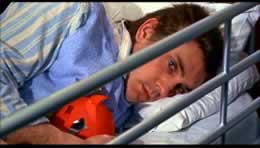 Most horror fans know the name Amicus Films for a string of memorable anthology films like Tales from the Crypt and Asylum, but occasionally they dabbled in feature-length stories as well like The Skull and I, Monster. None of these achieved the popularity of their omnibus classics, but one of their more adventurous efforts was 1970's little-known but fascinating The Mind of Mr. Soames. A young Terence Stamp stars as the titular John Soames, a man whose thirty years on earth have mostly been spent in a coma. Upon awakening, he finds his still childlike consciousness having difficulty coping with the world around him as the head doctor (Robert Vaughn) pushes him towards a mature mental state in record time. Not surprisingly, the world proves less than hospitable as Soames finds himself on the run from the authorities... Blending elements of science fiction and psychological horror into a memorable character study, this nifty little gem features one of Stamp's best, most unheralded performances, not to mention a solid supporting cast including Nigel Davenport and Donal Donnelly (not to mention ace cinematography by Women in Love's Billy Williams). TV director Alan Cooke doesn't do much to distinguish himself here, but everyone else involved ensures it's still time well spent. Sony's MOD release features an excellent, very colorful transfer, presented in anamorphic widescreen (1.85:1) and a huge leap over the very dated transfers that used to circulate on pay channels in the '80s. Definitely recommended for Amicus or Stamp fans as well as anyone with a fondness for '70s British cinema.
Most horror fans know the name Amicus Films for a string of memorable anthology films like Tales from the Crypt and Asylum, but occasionally they dabbled in feature-length stories as well like The Skull and I, Monster. None of these achieved the popularity of their omnibus classics, but one of their more adventurous efforts was 1970's little-known but fascinating The Mind of Mr. Soames. A young Terence Stamp stars as the titular John Soames, a man whose thirty years on earth have mostly been spent in a coma. Upon awakening, he finds his still childlike consciousness having difficulty coping with the world around him as the head doctor (Robert Vaughn) pushes him towards a mature mental state in record time. Not surprisingly, the world proves less than hospitable as Soames finds himself on the run from the authorities... Blending elements of science fiction and psychological horror into a memorable character study, this nifty little gem features one of Stamp's best, most unheralded performances, not to mention a solid supporting cast including Nigel Davenport and Donal Donnelly (not to mention ace cinematography by Women in Love's Billy Williams). TV director Alan Cooke doesn't do much to distinguish himself here, but everyone else involved ensures it's still time well spent. Sony's MOD release features an excellent, very colorful transfer, presented in anamorphic widescreen (1.85:1) and a huge leap over the very dated transfers that used to circulate on pay channels in the '80s. Definitely recommended for Amicus or Stamp fans as well as anyone with a fondness for '70s British cinema.
PREVIOUS SICK PICKS:
August 11, 2010
June 15, 2010
November 16, 2009
August 6, 2009
June 11 , 2009
March 19, 2009
October 27, 2008
August 7, 2008
July 25, 2008
May 31, 2008 (Aussie Special)
February 19, 2008
January 8, 2008
October 23, 2007
October 8, 2007
September 29, 2007
![]()